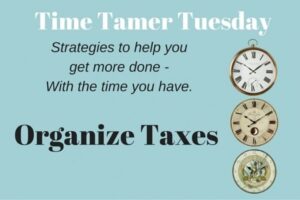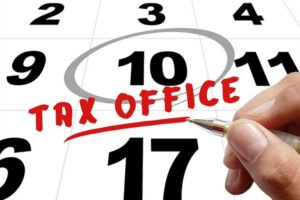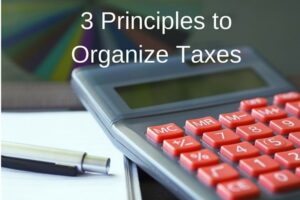It’s that time again. Time to organize taxes. Yup. Funny how it comes around every year at the same time.
And since it’s so predictable you’ve anticipated tax season and have everything ready. Right?
Ok if you answered yes, feel free to leave now and come back next Tuesday or next blog post, whichever comes first. For the rest of us, stick around and let’s see if we can help you with a couple of strategies to save some time, and maybe some money, on your income tax preparation.
Now, let me be clear – I am NOT an accountant. I am not offering any advise that might actually impact or have bearing on your tax submission. You will need someone with a CGA or CA after their name to help with that. But, with a CPO after my name, I can say i know something about getting things ready to organize taxes each year.
Many of my clients need help with this task. Some are running a small business and while creative, are not very organized. But they are clever and have hired me as a professional organizer to help. To organize taxes we use 3 simple principles.
File When it Arrives
As soon as those receipts and invoices show up, get them filed. Leaving receipts and invoices lying around, whether paper or electronic, is asking for them to start wandering around. And they do. Ever noticed how those chiropractor receipts managed to wander from the bag your were carrying when you got your last adjustment to the stack of paper on the table? The e-receipt from your last product purchase? Might still be buried in your email. File it as soon as you see the email to help organize taxes ahead of tax season.
File by Expense Type
Simple right? For some people, yes. They likely aren’t still reading. For the rest of us, resisting the temptation to drop all files into one folder, paper or electronic, that says “Income Tax”, is a tough job.
You know what your expense categories are unless our are filing income tax for the first time, as a young new employee or new business owner, and therefore have to organize taxes for the first time. By taking that one extra step to file the material according to the expense type, you will be saving yourself time and effort down the road. Depending on the role your book keeper and/accountant plays for you, you could also be saving yourself some money. Their time is precious and usually expensive. Especially around tax time.
Match Paper and E-Files
Although more and more paper files are becoming less and less of our lives and businesses, the reality is we are not yet free of the paper. So, you are likely to still have some paper and some e-files for your accountant. An accordion file works well for paper files. Most office supply stores carry accordion files with anywhere from 6 to 26 (alphabetized) pockets. Use the one that best matches the number of expense categories you use. I keep my categories lean so I use the 13 pocket style.
On the electronic side, set up an Income Tax folder with subfolders of the same categories. The result? Your brain only has to remember one set of categories and you will get used to using the folders, paper and e-files, the same way.
Can you feel your brain relaxing yet?
We organize taxes every single year. These three principles will help make it easier for you to be prepared. And might save you some money in book keeping and accounting fees. No more running around at the last minute looking for the telephone receipts.




